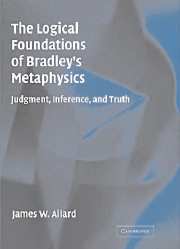8 - Truth
Published online by Cambridge University Press: 04 September 2009
Summary
Bertrand Russell made numerous remarks about F. H. Bradley. They were frequently inaccurate and seldom complimentary, but they were often cute and sometimes memorable, so many of them have become well known. Here is one of his comments on a consequence of Bradley's theory of truth, that truth has degrees:
If no partial truth is quite true, it cannot be quite true that no partial truth is quite true; unless indeed the whole of truth is contained in the proposition “no partial truth is quite true,” which is too sceptical a view for the philosophy we are considering. Connected with this is the difficulty that human beings can never know anything quite true, because their knowledge is not of the whole of truth. Thus the philosophy with which the view in question is bound up cannot be quite true, since, if it were, it could not be known to idealists.
(1966, 133)Russell directed these criticisms against Joachim, who said some seemingly paradoxical things about degrees of truth. But Russell also managed to implicate Bradley indirectly by implying that Bradley's view was identical to Joachim's. This was hardly fair. But quite apart from the intellectual merits of Russell's criticisms, which were considerable, his treatment of Bradley succeeded in giving an air of paradox to one of Bradley's more obscure views. Because error is generally preferred to confusion, Russell's dismissal of degrees of truth along with the rest of Bradley's theory of truth has been widely accepted.
- Type
- Chapter
- Information
- The Logical Foundations of Bradley's MetaphysicsJudgment, Inference, and Truth, pp. 175 - 206Publisher: Cambridge University PressPrint publication year: 2004

